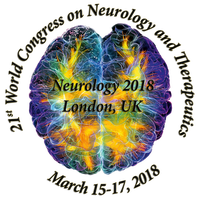
Hardeep Sahota and Peggy Fooks, Chelsea and Westiminister Hospital NHS Foundation Trust, UK
Chelsea and Westminster NHS Foundation Trust, UK
Title: A case of HSV encephalitis – presentation and management at a district general hospital
Biography
Biography: Hardeep Sahota and Peggy Fooks, Chelsea and Westiminister Hospital NHS Foundation Trust, UK
Abstract
A 19-year-old year university student was brought to the Emergency Department by his mother. He had been non-specifically unwell for about nine days, but his peers had called his parents when he began to become confused, disoriented and drowsy. On admission, he was complaining of headache and photophobia; his family had noticed right eyelid drooping. He had Glasgow Coma Scale/Score (GCS) 13 to 14 and generally weak, but no focal neurology on examination. He was febrile-spiking 38.8℃. An urgent CT head scan was performed, followed up with an MRI, which together showed marked oedema in the right temporal lobe and, to a lesser degree, in the medial right frontal lobe. Significantly, 7 mm of midline shift and effacement of the ventricles was noted. He was commenced immediately on IV aciclovir treating for likely HSV encephalitis with empirical ceftriaxone cover. Although the diagnosis was uncertain, a lumbar puncture was not performed as his imaging showed raised intracranial pressure. His case was discussed with Neurosurgical Registrar at our tertiary referral center, and the local Neurology Consultant. Neither of them felt that an immediate transfer to a neurosurgical unit was necessary given his GCS was relatively stable and he had been commenced on treatment for the most likely diagnosis. He was reviewed by ITU on site who did not find an indication to admit him to HDU while he remained stable. After 48 hours of antimicrobials and supportive therapy, his GCS deteriorated fluctuating between 8 and 13. There was still no focal neurology observed. A repeat CT showed new hypodense regions in the left hemisphere and increased midline shift at 12 mm. the condition was discussed with neurosurgeon who recommended urgent decompression surgery. They asked that the patient be intubated immediately and transferred as urgently as possible to the theatre for decompressive craniotomy. Audiences will gain knowledge on the following topics after the presentation: herpes simplex encephalitis is associated with 70% mortality if untreated; delay in treatment leads to higher morbidity and mortality; clinicians should aim for MRI to correlate images with the clinical presentation; aciclovir must be started immediately and only stopped once lumbar puncture definitely rules out diagnosis which can take up to ten days from having the initial investigation; and a combination gold standard for diagnosis are MRI, CSF, PCR for viral DNA.

